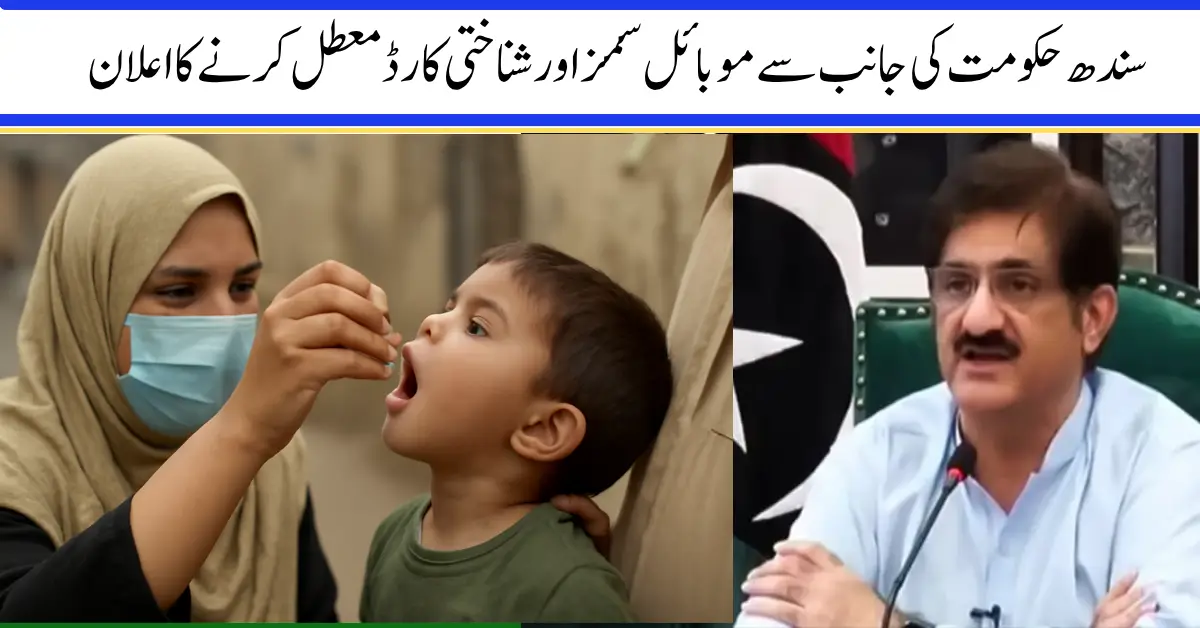Parents Refusing Polio Vaccination
Polio remains a significant health threat in certain parts of the world, and Pakistan, particularly Sindh, has been at the forefront of global efforts to eradicate this disease. However, despite numerous campaigns and government initiatives, some parents refusing polio vaccination continue to avoid getting their children vaccinated against polio. To combat this, the Sindh government is considering strict measures, including blocking mobile SIMs, suspending national identity cards (NICs), and even revoking passports of parents who refuse to vaccinate their children. Let’s dive into the details of this controversial plan and explore why it is being considered as a solution.
Sindh Government’s Stance on Polio Vaccination
The Sindh government, led by Chief Minister Murad Ali Shah, has made it clear that they are taking a strong stance against polio vaccine refusals. According to Shah, polio eradication is not just a public health concern but a national responsibility. He stated that the government has exhausted all other means and now must take strict action against parents who fail to comply with the vaccination drive.
The polio vaccination campaign, a crucial part of Pakistan’s efforts to eliminate the disease, has seen tremendous success in some areas. However, there are still pockets where misinformation, fear, and cultural beliefs prevent children from receiving the life-saving vaccine. As a result, the Sindh government is stepping up its enforcement efforts to make sure that every child is protected from this debilitating disease.
New Directive in Rawalpindi Prohibits Registration of Marriages in Court Premises
Proposed Measures Against Refusing Parents
In a bold move, the Sindh government has announced that it will implement strict punitive measures against parents who refuse to vaccinate their children. These measures include:
- Blocking Mobile SIMs: One of the most drastic steps being considered is blocking the mobile phone SIM cards of parents who refuse the vaccination. By doing so, the government aims to restrict communication, making it harder for these parents to stay isolated or spread anti-vaccination rhetoric. This measure is expected to serve as a strong deterrent, as access to mobile communication has become an essential part of daily life.
- Suspending National Identity Cards and Passports: The government is also considering suspending the national identity cards (NICs) and passports of non-compliant parents. These documents are essential for various social services, including healthcare, education, and travel. By suspending them, the government intends to remove the privileges and benefits of parents who refuse to protect their children against polio.
These actions, though controversial, are part of the government’s drive to ensure that the polio vaccine reaches every child, thereby protecting public health and advancing the goal of eradication.
Purpose and Goals of the Nationwide Polio Campaign
The national polio campaign, running from October 13 to October 19, aims to vaccinate millions of children across Pakistan, including those in Sindh. The campaign’s goal is not only to administer the polio vaccine but also to educate parents about the critical importance of immunizing their children. This effort targets parents who, for various reasons, have not yet vaccinated their children and seeks to change their minds by providing accurate information and addressing concerns.
By creating widespread awareness and convincing parents about the safety and effectiveness of the vaccine, the government hopes to overcome resistance and prevent any further outbreaks of the disease. This campaign is a crucial step toward achieving a polio-free Pakistan.
Holy Family Hospital to Introduce Kero Ablation Machine (KAB) for Advanced Cancer Treatment
Polio Eradication Progress in Karachi
In Karachi, one of the most populous cities in Sindh, efforts to eradicate polio are intensifying. Syed Hassan Naqvi, the Commissioner of Karachi, recently visited the South District to review the progress of the ongoing polio vaccination campaign. During the visit, Naqvi emphasized the need for parents to make it mandatory for their children to receive polio drops as part of the national vaccination drive.
Naqvi also pointed out that while many parents are cooperating with the campaign, there remains a small group of individuals who continue to refuse the vaccine. He stated that these parents must be persuaded and reminded of their duty to protect their children and the broader community from this preventable disease.
Impact of Non-Vaccination and Public Health Risks
The refusal to vaccinate children against polio poses serious risks to public health, not just within local communities but nationwide. Polio is a highly contagious disease that can lead to permanent paralysis, and in some cases, death. Children who are not vaccinated remain vulnerable to contracting the virus, which can quickly spread to other unvaccinated individuals.
Moreover, Pakistan is one of the few remaining countries in the world where polio is still endemic. If vaccination rates do not improve, there is a real danger that polio could make a comeback, undoing the years of progress made in eradicating it.
For this reason, the government’s hardline approach is seen as necessary to safeguard public health and ensure that Pakistan does not fall behind in the global effort to eliminate polio once and for all.
Government’s Awareness Campaign and Outreach Efforts
To complement its strict enforcement measures, the Sindh government is also focusing on raising awareness about the importance of polio vaccination. This includes a combination of:
- Community Engagement: Local health workers, volunteers, and community leaders are being enlisted to speak with parents, particularly those who are hesitant about the vaccine. These individuals are trusted figures in their communities and can help to alleviate fears and misinformation.
- Educational Programs: The government has partnered with various organizations to distribute educational material and conduct workshops aimed at informing parents about the benefits of vaccination. This initiative is especially critical in rural areas, where access to information may be limited.
- Media Campaigns: Radio, television, and social media platforms are being used to spread the message about the importance of polio vaccination. Through these channels, the government hopes to reach a larger audience and build widespread support for the campaign.

